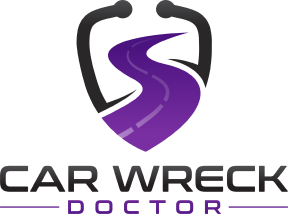If you've had the unfortunate experience of being involved in a motor vehicle accident, there's a chance you've also suffered an injury.
There are several different types of injuries you can sustain during a car accident, some that won't require any medical attention, while some will require extensive treatment and can change the course of your life.
And if you haven't been in a car wreck before, the odds aren't in your favor.
Somewhere between 20 and 50 million people are injured in car accidents every year.
So even if you haven't experienced an auto accident yet, it's still good to know about them so you're prepared when, or if, it happens.
Some common injuries won't be immediately apparent.
Sometimes, it takes hours, days or even weeks before you start noticing whiplash symptoms.
That's why it's important to see a doctor after a car accident even if you don't have any physical signs of an injury.
There could be something wrong that you just don't feel yet.
One of the injuries that can take a while to show itself is whiplash.
In the article below, we'll discuss the signs and symptoms of whiplash, and what you can do to treat it.
Table Of Contents
- What Causes Whiplash?
- The Main Symptoms Of Whiplash
- How Can You Rule Out Whiplash?
- How Long Does Whiplash Last?
- How To Treat Whiplash
- Use Chiropractic Care To Treat Your Whiplash
What Causes Whiplash?
Whiplash is most often associated with car accidents, and a good amount of whiplash cases do occur because of rear-end collisions.
The impact of a car accident that snaps your head forward or backward is a main cause of whiplash.
Whiplash can also occur due to a sports injury, sports accidents, physical abuse, or daily activities that may take a toll on your upper neck like lifting a heavy object.
Even riding amusement park rides can cause acute symptoms or neck stiffness afterwards.
Anything that forces your neck to snap forward and backward can cause whiplash.
The injury arises when the discs, ligaments, nerves, or neck muscles are damaged because of the movement.
Sometimes a small vessel can tear after an accident, releasing inflammatory substances, causing swelling and chronic pain for months.

The Main Symptoms Of Whiplash
The signs of whiplash can show up immediately, or, like we've already talked about, it could take several days or longer to start seeing symptoms
The 8 most common signs of whiplash are:
- Arm Pain
- Muscle spasms
- Decreased range of motion
- Headache
- Stiff neck
- Neck sprain
- Chronic neck pain
- Memory issues
How Can You Rule Out Whiplash?
MRIs, CT scans, and X-rays can be used to diagnose whiplash if it is suspected.
Sometimes, though, the injuries caused by whiplash occurs within structures too small to be seen on those tests.
That's why in most cases the common whiplash symptoms and a physical exam are the best ways to either diagnose or rule out a case of whiplash.
During the exam your doctor will move your head, neck and arms.
- Range of motion in your neck and shoulders
- Nerve irritation in your spinal cord
- Degree of motion that causes pain or an increase in pain
- Tenderness in the neck, shoulders or back
- Reflexes, strength and sensation in your limbs
How Long Does Whiplash Last?
Most neck pain goes away within a few days, and even more, will disappear within three weeks to months.
Studies show, however, that anywhere between 12 percent and 50 percent of people still have persistent neck pain a year after the initial injury.
Certain long-term effects will contribute to this lingering pain.
Some of them are:
- You experience severe pain at the start
- Your pain develops into long-term issues right after the accident
- You have neurological symptoms such as memory loss
- Your pain shoots into your arm or fingers
Most pain will go away in a relatively short time, especially if it's treated properly soon after the accident.
Treating Whiplash Injuries and Symptoms
Depending on if it's severe whiplash, or not, your doctor may prescribe anti-inflammatories or muscle relaxants.
Heat and cold therapy are also useful if it's a severe injury, but heat therapy tends to see better results because it helps loosen the tight muscles.
The purpose of treatment is to help regain your range of motion as quickly as possible.
Physical therapy should be started as soon as possible, and typically focuses on stretching, rotating, and moving your neck back and forth.
There are also a handful of exercises you can do at home to help treat your whiplash.
Do these exercises three to four times a day for just a few minutes, but always consult your doctor before starting a new exercise routine, especially after an accident.
- Rotate your neck side to side gradually, far enough to stretch your muscles but avoid causing pain.
- Tilt your head side to side, as if you are holding your phone between your ear and shoulder.
- Move the neck forward toward the chest and backward.
- Roll your shoulders in circles.
Want more information on whiplash treatments? Read our blog post: "The 4 Best Medical Treatment Options for Whiplash Injuries."

Use Chiropractic Care To Treat Your Whiplash
Chiropractic care is an excellent choice for the treatment of whiplash.
Because each individual case of whiplash is different, there isn't a one-size-fits-all approach when it comes to treating whiplash with chiropractic care.
The appropriate techniques will be unique to each patient suffering from whiplash and will be tailored to fit the needs of each patient during the chiropractic exam.
- Spinal manipulations
- Electrical nerve stimulation
- Muscle relaxation and/or stimulation
- Various neck exercises and stretches
- Motion exercises
- Recommended ergonomic and lifestyle changes
If you've been experiencing ongoing pain from whiplash after an automobile accident, it might be time to see a chiropractor or healthcare professional.
Your chiropractor can diagnose your whiplash and devise a treatment plan that will get you back to normal as quickly as possible.
If you don't have a chiropractor, reach out to the Car Wreck Doctor. They have a network of chiropractors, and they will get you matched with one that can take care of your whiplash.
Click the button below to get started.


